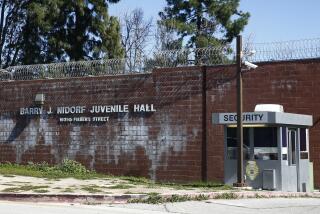Misuse of Education Funds Cited
U.S. prosecutors allege that the state Department of Education mismanaged millions of federal dollars earmarked for English and citizenship classes for California’s adult immigrants, according to a letter sent to the department.
In a Dec. 17 letter, the U.S. attorney’s office in Sacramento told state Supt. of Public Education Delaine Eastin that its investigation has found evidence of “potential criminal and civil violations of the law.”
The letter is the strongest indication yet that federal authorities may pursue criminal or civil actions against the state agency.
Among the office’s findings is that the California Department of Education--responsible for allocating federal funds for the state’s English as a Second Language/Citizenship program--ignored evidence of gross abuse by organizations in charge of conducting the classes.
Moreover, the agency failed to disclose the problems to the federal authorities and instead “knowingly gave the impression that the program was operating according to federal law,” prosecutors said in the letter.
In one case, the letter states, the department failed to heed the reports from its own staff consultant that Fresno-based Colegio de Amnistia listed nonexistent training sites in its application.
In another instance, Hermandad Mexicana Nacional, a community-based organization with offices in Orange County and Los Angeles and one of the largest participants in the program, continued to receive money from the state despite Hermandad’s “tax deficiencies and other delinquent payment problems.”
Eastin was not available Wednesday, but in a prepared statement she said: “I have always taken these concerns seriously, and one of my highest priorities as superintendent has been to strengthen oversight and monitoring of all recipients of federal funds.”
Hermandad officials did not return calls Wednesday requesting comment, but Department of Education spokesman Doug Stone said his agency is reviewing student data the organization provided to determine how many people actually took the classes.
“We are still in the process of evaluating how much money they will have to pay us back,” Stone said.
Last year, the state Department of Education ordered Hermandad to repay $4.3 million allotted for the classes. The state stripped the agency of any new funding because of Hermandad’s inability to provide proof of how it spent the money. Hermandad has appealed that order.
The letter from the federal prosecutors does not say whether any legal action would be taken against Hermandad or the nine other organizations under scrutiny in the probe. In the past, Hermandad officials have denied any wrongdoing.
Federal authorities estimate that between 1994 and 1998, California received $36 million to fund its English as a Second Language/Citizenship program. Of that money, $14 million was spent by the community organizations such as Hermandad.
“The [California Department of Education] established a virtually meaningless review process for funding compliance,” Assistant U.S. Atty. Michael H. Hirst said in the letter. “The ‘checklists’ utilized . . . were so cursory that virtually all entities would be found in compliance with program requirements.”
Hirst set a Jan. 17 deadline for a response from Eastin.
The prosecutor declined Wednesday to comment on possible action against the state agency, but his letter indicates the possibility that charges might be filed against the state agency.
In the letter, Hirst said it is “our desire is to work with the state to resolve the concerns.”
Last summer, a state audit found that the Department of Education mismanaged $21 million in program money by funding expenses that the community-based organizations could not substantiate.
If the federal authorities file legal charges against the department, the state may end up paying as much as “three times the damage caused by its conduct,” the letter states.
*
Times staff writer Mark Gladstone contributed to this report
More to Read
Sign up for Essential California
The most important California stories and recommendations in your inbox every morning.
You may occasionally receive promotional content from the Los Angeles Times.










